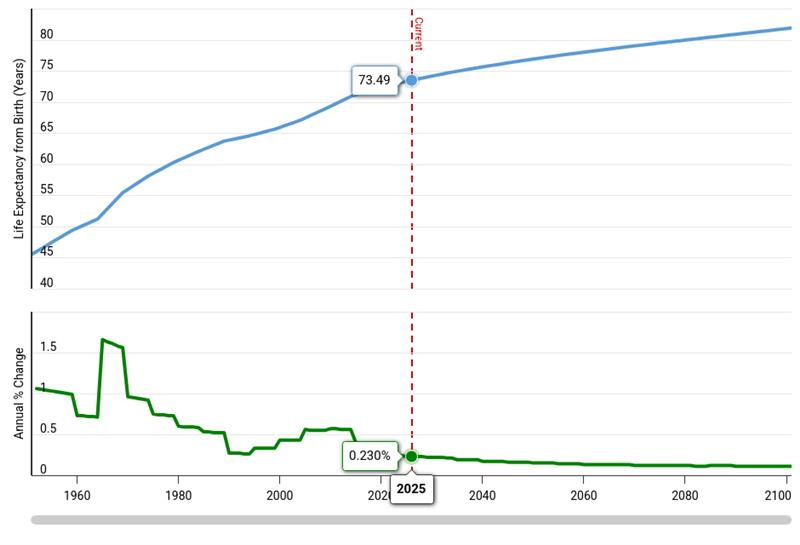Aging Is Not a Disease, rather a New Beginning: Redefining Support for the Elderly
- Srishti Chand
- Apr 16, 2025
- 3 min read
Aging is a natural, inevitable process—just another phase of life, full of experiences, wisdom, and new opportunities. Yet, for far too long, society has treated it like something to be feared or a disease that needs to be cured, rather than a natural transition. With global life expectancy now averaging 73 years due to the advancements in healthcare and living conditions, compared to just 45 years in 1950, it's time we rethink how we support and celebrate aging, rather than viewing it as a decline.

Shifting the Narrative: Embracing Aging as a Natural Process
For decades, the conversation around aging has been riddled with negative connotations. The prevailing notion that aging equates to deterioration is outdated. beginning. outdated. Sure, our bodies change as we grow older, but does that mean we should treat aging like an illness? Absolutely not. With the right approach—one that prioritizes wellness, purpose, and connection—growing older can be fulfilling and rewarding.
Take the example of the 89-year-old Masako Wakamiya from Japan, who learned to code in her 80s and developed a mobile game app to help fellow seniors stay mentally active. Stories like hers demonstrate that aging doesn’t mean slowing down; rather, it means adapting and thriving.
Increased Life Expectancy
Life expectancy has increased significantly over the years, meaning retirement is no longer the final chapter but ratsignificantly. her a new beginning. This shift calls for better healthcare, financial planning, and policies that genuinely support senior citizens. Preventive healthcare, easy access to medical facilities, and home-based care options can make a world of difference in how comfortably and independently people age.
Financial Literacy is Key
Understanding how to manage savings, investments, and pension schemes helps individuals plan for a stress-free retirement. Yet, studies show that nearly 77% of Indian seniors are financially dependent on their family members. With longer life expectancies, financial security becomes a crucial aspect of aging with dignity. For that, governments and private institutions need to ensure that pension systems are not only accessible but also sustainable in the long run.
Redefining Workforce Inclusion
Gone are the days when turning 60 meant stepping away from the workforce entirely. Many older professionals have a wealth of experience and knowledge that businesses can still benefit from. In India alone, the workforce participation rate for individuals over 60 is around 15%, but with flexible work policies like part-time roles, consulting positions, and mentorship programs for retirees, this number can rise significantly. Digital literacy programs and vocational training can help older adults adapt to evolving job markets, while supporting them with funding and entrepreneurial opportunities can drive economic growth.
Combating Social & Emotional Isolation
Aging isn’t just about health and finances; emotional and social well-being play a major role too. Loneliness and isolation are some of the biggest challenges older adults face, with nearly 23% of seniors in urban India living alone. But that doesn’t have to be the norm. Community engagement, lifelong learning, and staying connected through technology can help maintain an active and fulfilling lifestyle.
Simple things—like picking up a new hobby, joining a club, or participating in volunteer programs—can make a big difference. Consider the rise of senior citizen co-housing communities as well, where older adults live together, share responsibilities, and create support networks. Digital tools also play a role in keeping seniors connected with their loved ones, making sure they don’t feel left behind in this fast-paced world.
Prioritizing Preventive Healthcare & Wellness
Rather than treating aging as an ailment, healthcare systems must focus on preventive care and holistic well-being. Personalized healthcare plans consisting of regular health screenings, dietary guidance, and fitness programs should bseniors. life. for seniors. Early mental health support is crucial for addressing issues such as cognitive decline, dementia, Alzheimer's, and depression. Meanwhile, AI-powered health monitoring devices and telemedicine services ensure timely interventions and better healthcare outcomes.
Building an Age-Inclusive Society
If we truly want to support aging as a positive life experience, policies and workplaces need to adapt. Governments should invest in better healthcare systems, improve pension schemes, and launch senior employment programs. Businesses, on the other hand, should focus on creating an age-inclusive culture that values experience, along with promoting mentorship and elder-friendly workspaces.
Organizations like Posterity Foundation are already working toward this by advocating for skilling programs, employment opportunities, and holistic healthcare support for the elderly, as we believe that a society that embraces its aging population with respect and support is the one that thrives collectively.
Conclusion
Aging is a privilege, not a problem—it is the transition into a new stage of life where wisdom meets opportunity. With the right systems in place, aging can be just as fulfilling as any other phase of life. Instead of focusing on what’s lost, let’s shift our mindset to what’s gained—experience, resilience, and new possibilities. As a society, we must collectively ensure that our seniors live with dignity, purpose, and adequate support, as by shaping a perspective that respects and supports aging, we can redefine growing older as something to look forward to, rather than something to fear.
.png)




Comments